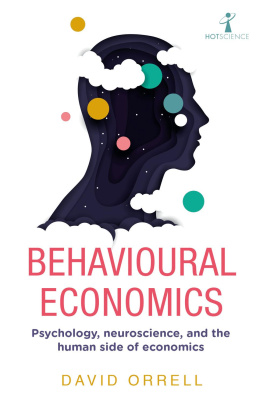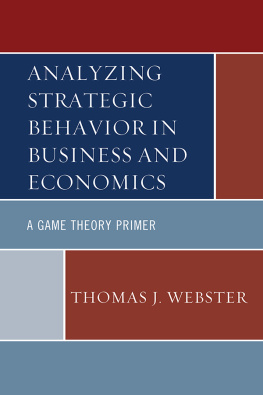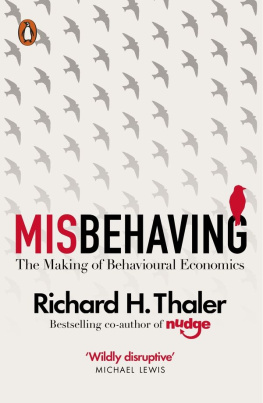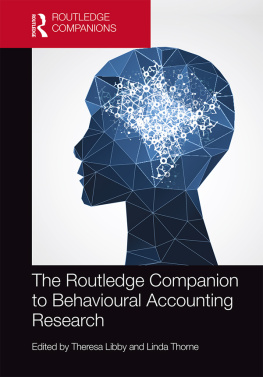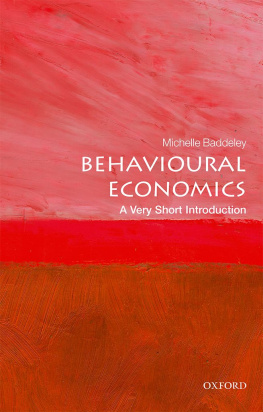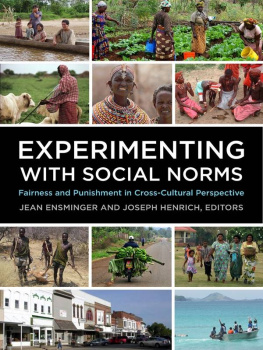SOCIAL PREFERENCES
An Introduction to Behavioural Economics and Experimental Research
MICHALIS DROUVELIS

To my family
Michalis Drouvelis 2021
This book is copyright under the Berne Convention.
No reproduction without permission.
All rights reserved.
First published in 2021 by Agenda Publishing
Agenda Publishing Limited
The Core
Bath Lane
Newcastle Helix
Newcastle upon Tyne
NE4 5TF
www.agendapub.com
ISBN 978-1-78821-416-2 (hardcover)
ISBN 978-1-78821-417-9 (paperback)
British Library Cataloguing-in-Publication Data
A catalogue record for this book is available from the British Library
Typeset by JS Typesetting Ltd, Porthcawl, Mid Glamorgan
Printed and bound in the UK by TJ Books
CONTENTS
The present book offers an introduction in the experimental economics literature pertaining to aspects of individuals social preferences. In its nine chapters and two appendices, this book discusses some key experimental economics paradigms that behavioural scientists are frequently using in order to gain a better understanding of human behaviour. These paradigms consist of bargaining games, trust games, simultaneous public good games without and with punishment, and sequential public good games. The extant literature has produced a huge literature and has considerably advanced our knowledge. The aim of this book is not to present a comprehensive literature review of the existing social preferences experiments. Instead, we offer an accessible discussion of a selective part of the literature that can be used for a semester-long course in behavioural and experimental economics, with a focus on social preferences. The book is targeted at those who have little background in the field of experimental economics and the choice of the topics discussed reflects a bias towards my own research interests. However, it is hoped that the offered discussion presents a series of novel and influential experiments in the literature.
It is also important to underscore that the length of each chapter has been selected with the main principle being that the material presented should be no more than 20 pages, which seems to be a sensible length for students weekly workload. In parallel, it was aimed that for some important papers, the key aspects of the experimental design, hypotheses and results are presented. The primary objective was to make the content of the book friendly to students, keeping the language as simple as possible (unlike academic papers which may use more technical terms sometimes) and helping them absorb the key elements more easily. At the same time, some experiments which are discussed in less detail aim to give students a general idea of the corresponding literature. Providing all this level of detail (at least) for some of the papers comes at a cost of limiting the number of papers that can be discussed in a given chapter but on the other hand, this structure hopefully gives a clearer description of the key papers, compared to other behavioural economics textbooks which only focus on a brief discussion of the main findings of papers. Some additional references are provided in the footnotes but these are complimentary in nature and discussion of these papers are much less detailed. Each chapter concludes by offering the main highlights through five bullet points, summarizing key issues discussed in the corresponding chapters. This, of course, does not substitute the level of detail included in the main text but it is meant to help students easily remember the main concepts for each chapter. At the end of the book, there are two appendices with useful material. contains a set of sample instructions corresponding to key games employed in experimental economics to measure aspects of individuals social preferences. This material is hoped to be useful for academics as well as students who design and plan to run an experiment either as part of their own research or an assessed component in a behavioural economics module. Appendix B includes some practical information for the conduct of economic experiments containing useful concepts and design options that are frequently discussed in experimental papers.
The main readership is expected to be undergraduate or postgraduate students who would like to receive an introductory treatment in the social preferences literature. Consequently, the writing style is not formal and tries to explain the relevant papers in a very simple and straightforward way. No previous knowledge in mathematics is needed as the explanation of the material is not based on technical terms and concepts. Beyond acquainting themselves with the realm of social preferences, students may also find the content of the book inspiring for their undergraduate and postgraduate dissertations. A number of key experimental economics frameworks are discussed and the simplicity of the discussion may be beneficial for students who think of possible research questions for the purpose of their dissertations or group presentations in experimental economics courses.
I hope that you find the content of the book fascinating and that this will be your first step towards obtaining a better understanding of experimental economics research. Economic courses are normally based on describing abstract theoretical models, omitting to discuss empirical evidence about how individuals actually behave. This book will provide you with such evidence and it will make crystal clear that how models assume people to behave and how they actually behave in reality are two completely different things in many occasions. The selfishness assumption positing that people only care about their own welfare and just ignore others is frequently refuted. To find out more about the bright side of human behaviour, read on!
As a final note, I would like to dedicate this book to my family whose constant and unconditional support helped me complete this project (as well as many other projects!).
Michalis Drouvelis
Economists use theories and mathematical models to describe certain economic phenomena observed in real-life. Such theories can be parsimonious and make specific assumptions about how individuals should and do actually behave. One very popular such theory is the standard economic theory assuming that individuals are rational and selfish, caring only about maximizing their own material self-interest. In economics, rational individuals are those who have a consistent objective that they want to achieve. When individuals objective is to maximize their own material gains from undertaking a certain action, such decision-makers are often described as Homo economicus who are assumed to have strong computational abilities, allowing them to weight accurately the costs and benefits of a decision that monetarily benefits them the most. Standard economic theory has been the central framework of analysis for many decades. But why this theoretical model has attracted so much interest in economics?
The main reason is that standard economic theory is a very simple model of economic behaviour, abstracting from the complications of natural environments where different factors are operative at the same time. Building economic models is like drawing a map. In both cases, it is important to consider which details are relevant to be specified and which are less relevant: maps are drawn including those details that enable travellers to arrive at their destination and economic models are built including those details which are relevant in that they can make predictions that describe well observed behaviour.


